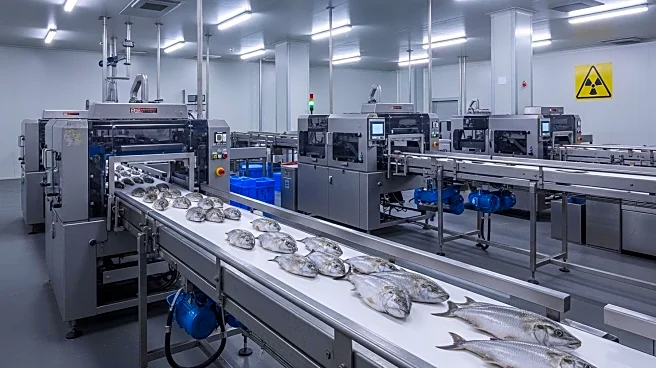What's Happening?
The U.S. seafood industry is undergoing significant changes following a radioactive contamination crisis involving cesium-137 in imported shrimp from Indonesian supplier PT. Bahari Makmur Sejati (BMS Foods). The FDA recalled over 40,000 packages of frozen shrimp, highlighting vulnerabilities in global supply chains. The contamination, although below the FDA's intervention threshold, posed long-term cancer risks, leading to financial and reputational losses for retailers like Walmart and Kroger. The crisis exposed limitations in existing inspection protocols, prompting the industry to diversify suppliers and invest in technology such as AI-driven inspection systems and blockchain-based traceability platforms. These measures aim to enhance transparency and compliance with updated FDA standards.
Why It's Important?
The crisis has significant implications for the U.S. seafood industry, emphasizing the need for robust supply chain resilience and regulatory compliance. Companies with concentrated supplier networks face increased risks of recalls and reputational damage, while those investing in technology and diversification are better positioned to navigate future disruptions. The FDA's intensified scrutiny of HACCP plans and international collaboration to combat illegal fishing highlight the evolving regulatory landscape. For investors, the situation presents both risks and opportunities, with firms leveraging technology and domestic aquaculture emerging as safer bets. The crisis underscores the urgency of proactive risk management and adaptation to changing standards.
What's Next?
The seafood industry is expected to continue its shift towards supplier diversification and technological innovation to mitigate future risks. The FDA's enforcement actions and international collaboration efforts will likely shape future trade dynamics, favoring firms prioritizing sustainability and transparency. Investors may focus on supporting companies that embrace these changes, positioning themselves as leaders in a more resilient and transparent market. The ongoing adaptation to regulatory standards and technological advancements will be crucial for the industry's long-term stability and growth.
Beyond the Headlines
The crisis highlights deeper issues within global supply chains, including the ethical and environmental implications of concentrated supplier networks and inadequate inspection protocols. The industry's pivot towards localizing supply chains and enhancing traceability reflects broader trends influenced by geopolitical tensions and trade policy shifts. The emphasis on sustainability and transparency may lead to long-term shifts in consumer preferences and industry practices, fostering a more responsible and resilient seafood market.










